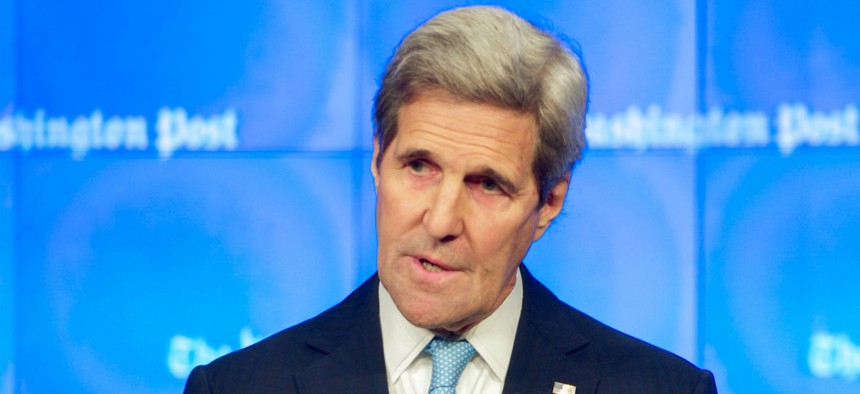
Kerry speaks at a ceremony to dedicate the Washington Post's new headquarters. State Department
John Kerry: Countries Without Free Speech Have Nothing to Brag About, or Teach the World
“Silence allows crime and corruption to rot whole countries,” Kerry says in speech on freedom of the press.
John Kerry criticized governments that censor free speech and control the media, at an address Thursday to mark the opening of the Washington Post’s new headquarters.
The secretary of state told editors and journalists, including the recently freed Jason Rezaian, who spent more than a year jailed in Iran, that free speech and press freedom are vital to a country’s success. “We see it in what happens in the absence of knowledge and the power that it gives to dictators, to demagogues, to tyrants,” Kerry said. “Silence allows crime and corruption to rot whole countries.”
Some of his comments suggested a nod to China, and perhaps and Cambodia. Just one day earlier Kerry was in Beijing, and before that he was in Phnom Penh; in meetings with both governments, he raised human rights issues.
So it is up to us, up to you, up to the defenders of liberty to close ranks. And this begins with the recognition that no government, whatever its pretensions and whatever its accomplishments, can fairly call itself great if its citizens are not allowed to say what they believe or are denied the right to learn about events and decisions that affect their lives. So let me underscore: A country without a free and independent press has nothing to brag about, nothing to teach, and no way to fulfill its potential.
To those who try to intimidate or imprison reporters, we need to stand up and say loud and clear that committing journalism, reporting on the truth, is not a crime. It is a badge of honor. It is a public service.
Beijing’s crackdown on free speech in mainland China (and even in Hong Kong) has increased in recent years as the government censors the press and what can be posted by citizens on social media. Journalists who challenge the state—along with professors, lawyers, bankers, and even feminists speaking out against sexual harassment—are routinely harassed, and often jailed. Some who are detained are coerced into providing confessions, which are broadcast nationally on state media to serve as a warning to others.
Even when major protests questioned the legitimacy of the Hong Kong government in 2014, people in the mainland heard little to nothing about the news. When images of the crowds appeared on Instagram, the last major foreign social media app accessible in China, that too was blocked.
In Cambodia, the government has also long quelled speech critical of the government and dissent from opposition lawmakers as well as underpaid factory workers.






